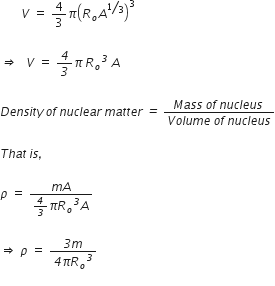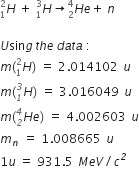 Short Answer Type
Short Answer TypeA proton and an α-particle have the same de-Broglie wavelength. Determine the ratio of (i) their accelerating potentials (ii) their speeds.
Show that the radius of the orbit in hydrogen atom varies as , where n is the principal quantum number of the atom.
Use the mirror equation to show that an object placed between f and 2f of a concave mirror produces a real image beyond 2f?
(i) A giant refracting telescope has an objective lens of focal length 15 m. If an eye piece of focal length 1.0 cm is used, what is the angular magnification of the telescope?
(ii) If this telescope is used to view the moon, what is the diameter of the image of the moon formed by the objective lens ? The diameter of the moon is 3.48 × 106 m and the radius of lunar orbit is 3.8 × 108 m.Write Einstein’s photoelectric equation and mention which important features in photoelectric effect can be explained with the help of this equation. The maximum kinetic energy of the photoelectrons gets doubled when the wavelength of light incident on the surface changes from  to
to  . Derive the expressions for the threshold wavelength
. Derive the expressions for the threshold wavelength  and work function for the metal surface.
and work function for the metal surface.
In the study of Geiger-Marsdon experiment on scattering of α particles by a thin foil of gold, draw the trajectory of -particles in the coulomb field of target nucleus. Explain briefly how one gets the information on the size of the nucleus from this study. From the relation R = Ro A1/3 where Ro is constant and A is the mass number of the nucleus, show that nuclear matter density is independent of A.

Consider an alpha-particle with initial K.E = 1/2 mv2 directed towards the center of nucleus of an atom.
The force that exists between nucleus and α-particle is Coulomb’s repulsive force. On account of this force, at the distance of closest approach ro , the particle stops and cannot go further closer to the nucleus. And, K.E gets converted to P.E.
That is, 
Hence, we can see that the size of the nucleus is approximately equal to the distance of closest approach, ro .
Now,
If ‘m’ is the average mass of the nucleon and r the radius of nucleus, then
Mass of nucleus = mA; where A is the mass number of the element.
Volume of the nucleus, V = 4/3 πR3
This implies, 
Therefore, the nuclear density is independent of mass number A.
Distinguish between nuclear fission and fusion. Show how in both these processes energy is released.
Calculate the energy release in MeV in the deuterium-tritium fusion reaction:
